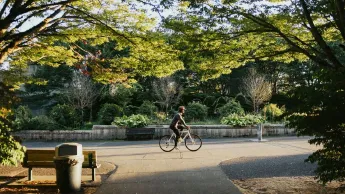How can we make our towns and cities more resilient and liveable for the future? That was the subject matter for this year’s Community Challenge. More than 60 alumni and alumni- teams contributed innovative and entrepreneurial ideas – from which the four-person jury selected eight to take part in a pitching event. These included an international team that involved a partnership among alumni from India and South Africa. The best projects were chosen during the online event at the end of September. The three winners each received an intensive coaching course to advance the implementation of their ideas.
Dynamism for the winning project
Challenge winner Asad Karišik from Bosnia Herzegovina is convinced that the coaching will add dynamism to his idea. His vision is to create a platform supported by AI that links a city's public transport system with micromobility services such as e-scooters – and thus motivate car drivers to switch to eco-friendly means of transport. ‘I’m really pleased that the jury recognised this project’s potential’, he says with joy.
The 49-year-old logistics engineer completed a professional development course at Capacity Building International (Internationale Weiterbildung und Entwicklung gGmbH – InWEnt) in Germany in 2006 to become a project manager for regional economic development. He is currently writing his doctoral thesis and wants to use the coaching to prepare a business plan that he can take to potential investors.
Harmful emissions and stress caused by traffic
Traffic in towns and cities generates considerable emissions that are harmful to the climate and to health. It also creates massive stress, because people in densely populated areas have to struggle day after day through congested roads to get to work or back home. More than 50 per cent of the world population now lives in cities. Climate change will alter their living conditions: the climate is becoming hotter and drier, while at the same time there is a threat of more extreme weather phenomena, such as flooding.
Six categories for projects concerning urban sustainability
So how do we make urban environments more resilient and improve life for all residents? That question was at the forefront of this year's Community Challenge. The ideas submitted were divided into six categories. In addition to the category of ‘Mobility and transport’, they included ‘Sustainable agriculture’, ‘Renewable energies and energy efficiency’, ‘Green urban infrastructure’, the ‘Strengthening of civil society and social inclusion’, and ‘Sustainable waste management’.
Tips from the pitching coach
At the start of the pitching event, pitching coach Bianca Praetorius gave the participating teams and also the audience some tips on how to successfully present a project. Her key message was that a good story isn’t enough; what she referred to as ‘business content’ is also important. ‘The project’s economic opportunities must be made clear, otherwise investors won't bite.’
A project on the home straight
Abolade Esuola from Nigeria heeded this tip. He has already formed a company and wants to build biogas plants in the Nigerian state of Oyo that turn waste and waste water from slaughterhouses and livestock farms into electricity and fertiliser. A potential investor, a company from Dresden, has already expressed interest. Now all that needs to be done is to persuade the local public authorities. ‘I’m optimistic that we’ll achieve this, because biogas plants solve several problems in one fell swoop. Firstly they process hazardous waste and sewage, which often enough simply ends up in the environment. We can also produce electricity and thus reduce energy bottlenecks’, Abolade Esuola explains.
Germany as a role model
The idea for his project came to the 50-year-old physicist when he was in Germany. He completed his MBA in International Management of Resources and Environment in Freiberg between 2014 and 2017. ‘I went to visit multiple biogas plants during this time and was impressed by the technology. I immediately realised that this could also be a good solution for Nigeria.’
E-bikes for women in Kampala
The third winner of this year’s Community Challenge is Christine Ssenteza from Uganda. The 39-year-old would like to establish an e-bike transport system in Kampala, her home country’s capital, and wants it to be particularly aimed at women. ‘Kampala is growing, there are lots of traffic jams, the air quality is poor. Everyone suffers from that, but women are additionally disadvantaged because they usually get the short end of the stick in the jostling for seats in the popular shared taxis, the matatus’, she explains. Women often have to accept that they will wait for hours.
Confirmation via the Challenge
E-bikes would enable women to be more independent – and give them the extra opportunity of contributing to climate protection, says Christine Ssenteza, who currently works as a project manager for a renewable energy company in her home country. She completed an MBA in Leipzig between 2009 and 2011. The programme teaches management skills for managers of smaller companies.
Christine Ssenteza’s idea envisages linking the e-bike service with a carbon-credit system. Users would make use of an app to receive credits for the CO2 emissions saved during their journeys and accordingly be rewarded with discounts from project partners. ‘The challenge has encouraged me that I am on the right track’, says Christine Ssenteza. This probably applies to all participants in the Challenge. Even if their pitch they didn't land them at the top on this occasion.

